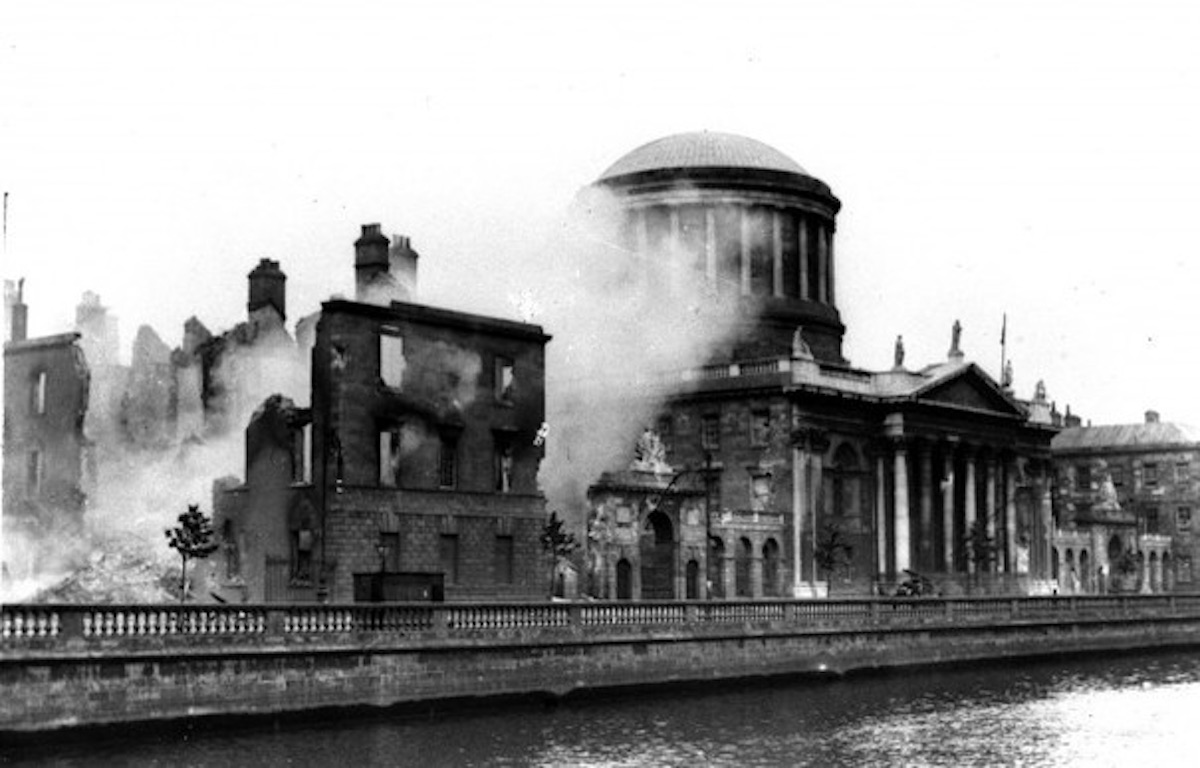
The Irish Civil War began a century ago this week with an attack on republicans at the Four Courts in Dublin, the centre of the Irish judicial system.
Late on the night of June 27, 1922, Free State troops in Dublin received orders to surround and if necessary attack the Four Courts in centre of the city.
The Four Courts was the headquarters of the anti-Treaty IRA in Dublin, led by Rory O’Connor. It had been occupied the previous April, in defiance of the Provisional Irish Government set up under the Anglo Irish Treaty.
For nearly three months in Dublin and around the country there had been an uneasy co-existence between two rival Irish armed forces; one the army of the Provisional Government, the other, the anti-Treaty IRA, who in a Convention in March had repudiated the authority of the Dáil and Provisional Government. The Four Courts faction was the most militant of all, and just days previously they had announced their intention to declare war on Britain.
On June 28 1922, pro-Treaty troops opened fire on the anti-Treaty garrison in the Four Courts, making the start of the Irish Civil War.
Pro-Treaty troops were loaned two eighteen pounder field guns by the British Army and tonnes of other weaponry to bombard the Four Courts into surrender. Inside the Courts, the 180-man garrison, unwilling to be the ones who fired first, watched as around 1,000 pro-Treaty troops surrounded their position, setting up a machine gun in the tower of St Michan’s Church which overlooked the complex and even blocking its gate with an armoured car.
Tom Ennis, the pro-Treaty commander issued the Four Courts with the following ultimatum at 3:40 am:
“I acting under orders of the Government hereby order you to evacuate the buildings of the Four Courts and to parade your men under arrest without arms on the portion of the Quays immediately in front of the Four Courts by 4 am. Failing compliance with this order the building will be taken by me, by force. You will be held responsible for any life lost and damage done.”
There was no chance that the order – giving the Four Courts garrison only 20 minutes to surrender completely and face arrest – would be obeyed. According to Rory O’Connor: ‘I received a note from Tom Ennis at 3:40 am demanding surrender by 4 am. He then opened attack at 4:07 am in the name of the government with rifles, machine guns and field pieces.’
The first shots from the 18-pounder boomed out across the river Liffey, followed by the crack of small arms fire. The Irish Civil War, the fratricidal conflict between former comrades had begun.
Cumann na mBan Volunteer Máire Comerford was awoken by the sound of the artillery fire. She immediately made her way to the Four Courts and reported to the OC. She wrote later: “The big guns seemed then to speak only with the voices of Arthur Griffith and Michael Collins, of Lloyd George and Churchill, of Orangemen and of Lords”.
The following day, a proclamation was issued by the Army Executive of the Irish Republican Army:
PROCLAMATION - FELLOW CITIZENS OF THE IRISH REPUBLIC
The fateful hour has come. At the dictation of our hereditary enemy our rightful cause is being treacherously assailed by recreant Irishmen. The crash of arms and the boom of artillery reverberate in this supreme test of the Nation’s destiny.
Gallant soldiers of the Irish Republic stand vigorously firm in its defence and worthily uphold their noblest traditions. The sacred spirits of the Illustrious Dead are with us in this great struggle. “Death before Dishonour” being an unchanging principle of our national faith as it was of theirs, still inspires us to emulate their glorious effort.
We, therefore, appeal to all citizens who have withstood unflinchingly the oppression of the enemy during the past six years to rally to the support of the Republic and recognise that the resistance now being offered is but the continuance of the struggle that was suspended by the truce with the British. We especially appeal to our former comrades of the Irish Republic to return to that allegiance and thus guard the Nation’s honour from the infamous stigma that her sons aided her foes in retaining a hateful domination over her.
Confident of victory and of maintaining Ireland’s Independence this appeal is issued by the Army Executive on behalf of the Irish Republican Army.
Signed,
Comdt.-Gen. Liam Mellowes,
Comdt.-Gen. Rory O’Connor,
Comdt.-Gen. Jos. McKelvey,
Comdt.-Gen. Earnan O’Maille,
Comdt.-Gen. Seamus Robinson,
Comdt.-Gen. Sean Moylan,
Comdt.-Gen. Michael Kilroy,
Comdt.-Gen. Frank Barrett,
Comdt.-Gen. Thomas Derrig,
Comdt. T. Barry,
Col.-Comdt. F. O’Faolain,
Brg.-Gen. J. O’Connor,
Gen Liam Lynch,
Comdt.-Gen. Liam Deasy,
Col.-Comdt. Peadar O’Donnell,
P. Ruttledge.
28th June, 1922.
![[Irish Republican News]](https://republican-news.org/graphics/title_gifs/rn.gif)
![[Irish Republican News]](https://republican-news.org/graphics/title_gifs/harp.gif)

